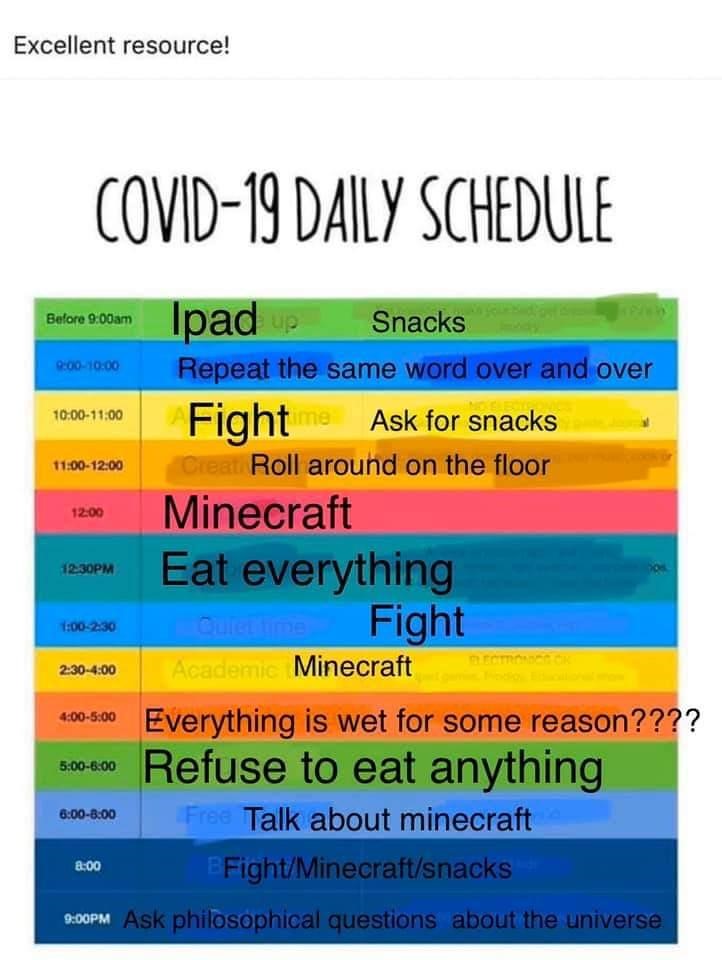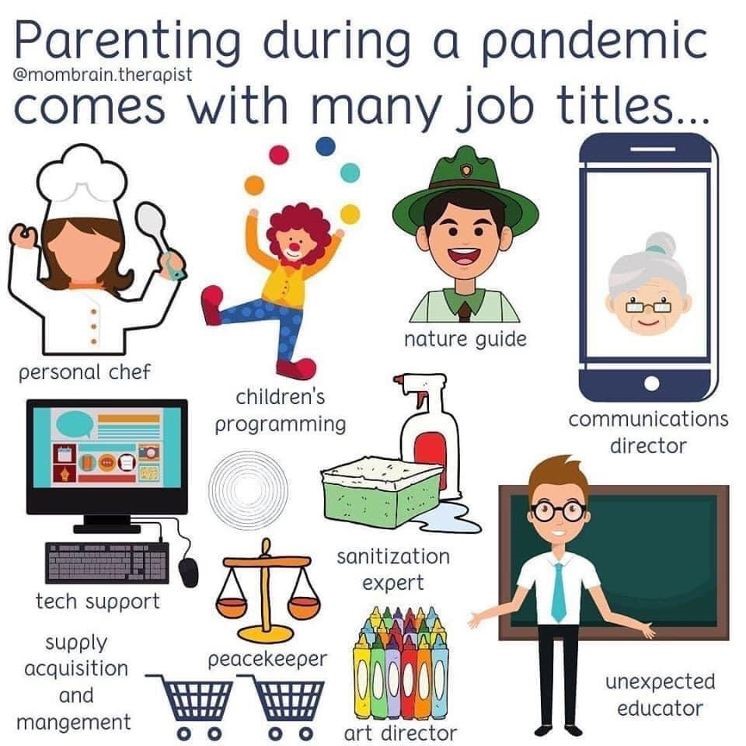As we talked about in the Home Schedules and Children column, our lives are arranged around natural and artificial rhythms (e.g., sunrise/sunset, seasons of the year, wake/sleep times, hunting for and gathering food, clockwork time, school, work, personal grooming and weekday/weekend, etc.). Typical teen rhythms include sleep/wake, school day, changing classes, project due dates, school year/summer break. These rhythms shape their days and help them be productive. We don’t often think about how helpful these rhythms are until a pandemic completely upends every single aspect of our life and throws us and our children together 24/7!
During this shut down, your teenager’s rhythms are all screwed up. This disruption of rhythms creates extreme stress. But teens are also very adaptable. If you give them an hour they will take a day. As you scan the horizon, you may have noticed that your teen is running as fast they can away from the road they should be on. Productive activity? Nope. Regular sleep/wake cycles? Nope. Taking care of responsibilities? Nope. The only thing on their schedule is distracting themselves and complaining that they are on break and should be able to do whatever they want.
Well, it’s past time for your teen to have a rhythm to their day that combines personal time with responsibilities. Schedules will help with that.
Scheduling Basics
Having a schedule doesn’t mean every minute has to be accounted for but it does mean that big blocks of productive time will recur regularly. Some of the blocks will be daily, some will be multiple times a week and others will be weekly.

With all the craziness and unstructured time your teen has been spending while we all waited to find out what was going to happen, they have created their own routines as well as driving you crazy “putting off” responsibilities. No doubt, it is looking something like this schedule. To get this turned around, you will need to identify what you expect your kid’s day to look like. Here are some of the basic categories.
Weekday/Weekend. What day is it? No one seems to be able to track what day it is during this never ending weekend from Hell. The best starting point for establishing a schedule is to return to the work day/week end framework. Your kid has already been trained to follow it. It is the schedule that will reemerge after the shut down. It will help as you insist on set sleep/wake times. It sets the time frame for task completion, i.e., “this week.” And it emphasizes that they are not on an endless holiday. Week days are for getting things accomplished. Weekend ends are for more personal activities.
Sleep/wake. Regular sleep and wake times keep teens mentally organized, physically rested (and you from losing your mind). Teens need 8-10 hours of sleep every night. Very few of them get it. This is not the time to finally require them get enough sleep though. (You won’t win that battle.) However, establishing set times to get up and to go to bed keeps your kid’s circadian rhythms from becoming dysregulated and, subsequently, having their mood, irritability and alertness become dysregulated. Their sleep/wake times should be tagged to the work week/week end. Your kid is familiar with it and they will be returning to this at some point. Your teen should be up by 9AM (10AM at the latest) and in bed by 11PM (12PM at the latest) during the work week (i.e., Sunday through Thursday). On week ends (i.e., Friday night through Sunday morning), they should be up by 11 at the latest and in bed by 2AM at the latest. You have wide latitude as a parent to decide what is acceptable. It is important that the sleep/wake times be clear and consistent.
Meals. Meals should occur at regularly scheduled times. These breaks in the day add nutrition and mark time. Being home all day makes it very easy for teens to double and triple up on the junk food as meals. Healthy meals are more important than ever with all the stress everyone is experiencing. Have healthy food around (e.g., fruits, vegetable, non-processed foods, etc.). You may need to have an open and closed time for the kitchen.
Academics/Learning Activities. The scope of the damage from this shut down to your teen’s academic progress is going to be significant. It will result in either the loss of the last quarter of school (if your child attends public schools) or the significantly reduced quality of new learning from various online educational approaches (if your child attends a private school). And, there is a well known concept in education known at summer learning loss. Across the summer break, kids can lose as much as a 30% of learned information from the preceding academic year, especially in math. In this way, summer break just started 2 months early for your teen!
But more than that, research and surveys on 21st century work skills consistently identify continuous learning as a critical skill for all employees, from hourly workers to the executive suite. “By some accounts, digital information doubles every 18 months. Currently it is estimated to be at 3 x 1021. (That is 3 with 21 zeroes after it.) That’s a lot of information. It is no longer sufficient to establish a basic knowledge set that will carry you through the end of your working career. Your kid will need to be life-long learner if they are going to continue to be a viable employee in the 21st century. (from Preparing Teens for the 21st Century Work Place: Intro)”
So. Talk to your teen about consolidating what they have learned this year and about the importance of life long learning. Expect them to dedicate time every day during the work week to their academic skill development and improvement. Their school is providing an array of academic activities to keep their skills up. (Highly competitive academic kids are already prepping for the AP exams but their other classes may be a wash.) Your teen should have at least 2 hours a day dedicated to developing or refining some specific academic skills: math, science, history/social sciences, reading. They should consider art, music (playing it not listening to it) and foreign language. There are a dizzying array of online resources for all of these from specific sites to YouTube channels to colleges and universities that post free lecturers online. Have your kid create a schedule that includes a block of time for academics.
Physical activity. Your teen is even more sedentary than they were before because they are not walking to the car and moving around in the school environment. They are also cut off from the structured activities associated with organized sports and physically active things they did before the shut down. Being sedentary has a negative effect on mood, thinking and physical health. Require your kid to have a daily block of time (at least 30 minutes) for exercise or physical activity. It can be anything. (Jim has a chapter in his book on the wide range of things that count as exercise.)
This can also be a time for you to get out there and get some exercise while also having some quality time with your kid. That is, unless you are highly competitive. Then, all that simmering frustration in the house could boil over and the neighbors will wonder why you and your kid are wrestling around in the yard. OK, maybe consider carefully whether it is a good idea for you to exercise with them.
Free Time. Teens need somewhere between 1-2 hours a day of alone time. This need has been seriously compromised with the advent of the internet and social media. While we don’t recommend that you “force” your kid to spend their free time any particular way. We do recommend that you encourage your teen to make time to just reflect and think (rather than updating their social media profile). Regardless, respect the importance for teens of time to themselves by having it be a part of their schedule.
Screens. The glory and horror of our modern age. There will be a future column that details important considerations about kids and their use of screens. (Stacy has a whole book about it that is as relevant to teens as it is to children.) The short version is set some limits and make sure the time they spend is less than any other activities. How information flows and is processed through screens as well as the actual physical effects of the electronic nature of screens on mood, cognitive processing and biological rhythms is well documented and troubling. With the shut down removing the natural screen time stop gaps of class time and activities outside of the house, screen time can careen out of control. Set some limits.
Social Media. This will also be another future column. Jim has written a lot about internet use and social media including using a developmental stages approach, a chapter on video gaming in his book, being a good cyber citizen and unplugging from the internet as a family, among others. Talk to your teen about their social media use. Have times when devices are put away. Consider having periods of time with restricted access (e.g., after bedtime, while doing homework, at family dinner, etc.).
Family Time. Though you might think that being locked into your home with everyone is more family time than a family can survive, there is a difference between time with family members and family time. It is important to have structured time together as a family to maintain emotional bonds, stay in touch with each other and enjoy each other’s company. This is best accomplished by planned, time limited, structured and regular gatherings as a family. Getting together over a meal, having a family movie or game night, going on a walk together; these are activities that have some structure to them (minimizing conflict or tension) and a positive tone (maximizing pleasantness in each other’s company). Carve out a couple of days a week (not all 7) and set limits on what can be discussed during this time. Rotate who gets to choose the activity. This is a time to just be together (not to review chores or whether they have done their homework). You know all those times you wished there was more time to just be together as a family?
Life of the mind/Culture. As we mentioned in the Academics/Learning section above, one of the most significant predictors of successful and happy people is being a life long learner. This is the intellectual equivalent of free play. Learning not because it is required to pass a course but because it results in personal growth and development. Consider encouraging your teen to schedule some time for activities that expand their point of view, perspective or knowledge in an area without any formal evaluation involved. Make sure there is a time set aside for book reading, informational video watching or art viewing. Or, instead of taking in other’s work, your teen might be interested in writing or making videos or creating art. Talk to them about making some time in their schedule for attending to the life of the mind.
Making the schedule
Sit down with your teen and review all of the things that need to be included in their daily (and weekly) schedule (see categories above). The schedule itself can be as simple as blocking off time across the day with colored markers on an old fashioned calendar; for example 8am-12pm academics, 12-1 lunch and clean up, 1-2:30 rest time and reading, 2:30-5:30pm extra activities. Fancy algorithms and elaborate charts aren’t required. Every cell phone has a calendar function. Calendars can be easily shared among family members.
Their schedule will be the concrete way that accountability is determined. Is it on the schedule? Did you do it? It also will protect your kid from your impulse to micro manage. “Dad, video game play is on my schedule and it’s not the time we agreed for me to turn it off.” Even when your kid tries to argue, they have less energy and quit sooner when it was right there on the schedule.
Whatever the form it takes make it specific and stick to it!
Beginnings are rough. Your teen has been running wild (with their time) for weeks now. They will push back against establishing a routine. Put all your energy upfront in developing the schedule. There are a number of elements to developing a successful schedule. Jim covers this in his book chapter on developing a family contract. Do everything you can to keep your cool. These are extraordinary times and the disruption in their routines and schedules as well as the family and societal stress has thrown your teen all out of whack. Just keep redirecting them to filling in the schedule. After about a week, revisit it to see how it’s working and discuss possible changes.

Don’t overdo it. This is all too much. Seriously. Don’t buy into this infographic. You can’t do everything. I know people keep telling you can but you can’t. You are not a teacher. You are not a recreational therapist. You are terrible at coming up with amazingly creative activities to recommend to your teen. You have a job (or need to be figuring out how to get one). Your kids need to learn to occupy themselves and be accountable for taking care of their responsibilities. Your kids need to get things done without you being constantly on their back. Schedules can help with that. And, we will have some suggestions about self-care in a future column.
So what is enough? Pick the major categories you think are important. These should at least include sleep/wake schedule, meals, academics, physical activity, quiet time and free time. You should limit screen time despite how well it keeps the precious angels mesmerized because it creates all kinds of trouble when they aren’t on the screens. (See Stacy’s book The 30 Day Blackout for reasons why). So that means your kid will need to have some kinds of constructive activities. Look for the sweet spot where you are not exhausted by doing too much but your kid has been adequately exercised and engaged in productive activities. (And, you determine what is “adequate.”)
Be flexible
Things will continue to change so you will have to adapt or . . . be overwhelmed. There will be some blocks on the schedule that will not change. You will decide what they are. On the other hand, blocks and activities can be added or removed or changed. Your child may be especially tired one day. YOU may be especially tired one day.
Rest
And finally, pay attention to getting adequate rest. And help your kid recognize the need for them to get adequate rest. What many of us have not encountered or incorporated into our lives is REST. Most of us have not prioritized rest, and now we are learning to rest, to pause, to take a break for an indefinite period of time requiring a skill few of us practiced well to begin with. You will really need this now. Meditation is an extremely beneficial practice to find rest in mind, body and spirit. It is short, doable, helpful and calms the nervous system in a season of life where none of us are in a place of power, but powerlessness. There are many different forms of meditation. There are apps that can help. Rest is important for making it through these difficult days.

